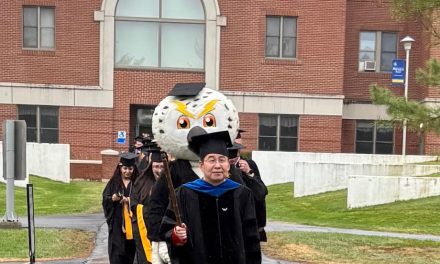By Belen Dougherty
Editor
Authoritarianism is not always loud. It does not always shout or wave a flag. Sometimes, it whispers, dressed in intellect, draped in the language of progress or change. It tells you that you’re free to think—so long as you feel the right way. It tells you you can speak if you say what it wants.
When Ukrainian President Volodymyr Zelenskyy stood before U.S. President Donald Trump and Vice President J.D. Vance, the message was clear: obey or be punished. This conversation was a test of loyalty, a demand for submission, a performance dressed as discourse.
And I recognized it—not on a world stage, not in politics, but in my classroom.
I am in my final year of college. I am a non-traditional student, a mother of three, a veteran, and an academic. My degree heavily applies different theoretical lenses, analyses, and readings. I have developed a learning method that works for me. My method is simple: identify the key components of a methodology and then make connections between the artifacts presented depending on the subject matter. I can identify differences and similarities across various disciplines by engaging with different methods.
I recently took a course in which methodological theories presented were absolute truths. When I questioned the structure or simplified the method, answers redirected me to the nuances. Responses left me wondering if I understood the method at all. How can I think of the nuances if I am not getting affirming feedback that I know the basic structure? Even worse, why was simplifying the method or comparing it to others seen as an opposing view rather than intellectual curiosity, most importantly, LEARNING?
For the first six weeks of the semester, I was frazzled, investing more time in the material and attempting to fit my learning into a box—inevitably, this left me drained. Up until this point, I couldn’t identify the problem. Was it my Attention Deficit Hyperactivity Disorder (ADHD)? Motherhood? Lack of sleep? Why does it feel like I am working hard yet “learning” so little? I thought.
“Grandma, what big eyes you have!”
The professor asked me to chat after class. The tension that day was so dense you could bite it. I sensed confrontation, and my immediate diffusing behavior emerged. I was already internalizing the situation, making it about me.
“We communicate differently and can’t seem to understand each other,” I began.
When this didn’t appease the situation, I delved into more “people-pleasing” tendencies, apologizing for making the class “harder.” I redressed for questioning the method; I blamed my brain and its cognition.
As I rambled about my deficiencies, the instructor did not stop me from ambushing myself; he allowed me to take the blame. He sat composed, watching with contempt; his silence affirmed what I had started to internalize the last couple weeks of class. These were the expressions of the feelings I had internalized from the beginning of this class ( I am a bad student — I’m not smart). I was finally defeated, embarrassed for getting emotional, for giving the professor a hard time. My questions were just a deficiency in my learning, and consequently, I was undermining the professor’s knowledge, position, and authority. Sadly, I just wanted to learn.
In this vulnerability, I felt so much guilt, culpability, and, truthfully, despair (although I didn’t realize it then). The instructor accomplished what he set out to do – steer me back to the right path.
His consolation was to reinforce his authority: “It’s okay, Belen; you’re a student.” The discussion ended with a metaphor: “Think of me as a shepherd leading the sheep.”
“Grandma, what big teeth you have.”
Back home, I thought about what had occurred. This had never happened to me before. I honestly never had any negative intentions. I was looking forward to this class. How did it disintegrate in such a short time and why was I made to feel deficient? Why was my confidence gone?
Earlier this week, my partner and I had a complicated conversation. He observed that I had been depressed longer than usual and that I didn’t seem like myself. I knew I struggled in class, but I didn’t know why. The material wasn’t as tricky as I described it. I analyzed the structure, deconstructed the conversation, and connected it to the classroom experience. Something wasn’t adding up.
I saw it. The conversation wasn’t about resolving conflict or understanding each other as teachers and students; it was a power move. The professor asserted their pastoral position and asked me to fall in line. That’s why that metaphor was so jarring—”think of me as a shepherd leading the sheep.”
I reflected on the last six weeks and all my interactions with this professor. I recalled microaggressions, annoyance, and, most importantly, the language used in class. The instructor didn’t use the material as a lens; they treated it as a dogmatic belief. Questioning the method, simplifying it, and even comparing it to other theoretical models was seen as dismissive and opposing.
I realized I wasn’t the only student experiencing this; I connected the dots and saw that someone was painting us as problematic students. For the first time, I felt the immediate impact of intellectual oppression. The consequences hit hard—I doubted my own experience and intellectual abilities.
“All the better to eat you!”
If I hadn’t had an unyielding brain, this would have been when I would have returned and surrendered to the shepherd. I felt an instant relief—this professor was engaging in dogmatic teaching, asserting his power and authority through a hegemonic pedagogy where my intellectualism could not exist. I am not broken!
“Not today Grandma!”
What I find more disturbing after the fact is that all of this is under the guise of higher education, and not just higher education but progressive or left-leaning ideals. When the right makes claims that critical theory is brainwashing students, it seems like a radical and misguided claim, especially for those of us who understand the power of education and engage in critical thinking. But I was wrong. It does happen because it happened to me.
Truthfully, critical thinking is more important now than ever. Whether you are a conservative or a liberal, a Christian or a Muslim, part of the majority or minority, it’s our responsibility to be vigilant of those who prey upon our freedoms. That’s not to say that I inherently agreed with a left-leaning professor, and I subscribed to this type of abuse. Still, I believe in the power of learning, which this person used as a disguise for their agenda (something I won’t pretend to know).
Academic and social spaces should always offer an opportunity to connect and to see and share differences. Pedagogy that is rooted in critical thinking shouldn’t try to convert. The purpose of education should be to engage with people with different values and beliefs, learn from each other, and be seen as who we are — sometimes, you will take something with you and leave something behind. Still, that exchange creates meaningful discussions, brings on social changes, and, most importantly, an understanding of who we are and how we want to engage with others. However, this goal occurs with respect, openness, and knowledge. If that is not encouraged, it creates an isolating environment in which you choose between the right way of thinking or your way, inherently creating a hostile academic environment and one that divides us more. I’m still in the process of making sense of this experience. It will take time to regain my confidence, especially in my intellect and myself. I still don’t understand how this could happen to me. However, something I can take away is that I never want to make someone feel how I did that day. This belief reinforced and confirmed my value system of treating people with kindness and respect and never being rigid in my thinking.





